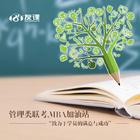
友课教育-管理类联考英语晨读2018-05-27
介绍: Critical window for learning a language
外语习得最佳年龄
There is a critical cut-off age for learning a language fluently, according to research. If you want to have native-like knowledge of English grammar, for example, you should ideally start before age 10, say the researchers. People remain highly skille...
介绍: Critical window for learning a language
外语习得最佳年龄
There is a critical cut-off age for learning a language fluently, according to research. If you want to have native-like knowledge of English grammar, for example, you should ideally start before age 10, say the researchers. People remain highly skilled learners until 17 or 18, when ability tails off. The findings, in the journal Cognition, come from an online grammar test taken by nearly 670,000 people of different ages and nationalities. The grammar quiz was posted on Facebook to get enough people to take part. Questions tested if participants could determine whether a sentence written in English, such as: "Yesterday John wanted to won the race," was grammatically correct. Users were asked their age and how long they had been learning English, and in what setting - had they moved to an English-speaking country, for example? About 246,000 of the people who took the test had grown up speaking only English, while the rest were bi-or multilingual. The most common native languages (excluding English) were Finnish, Turkish, German, Russian and Hungarian. Most of the people who completed the quiz were in their 20s and 30s. The youngest age was about 10 and the oldest late 70s. When the researchers analyzed the data using a computer model, the best explanation for the findings was that grammar-learning was strongest in childhood, persists into teenage years and then drops at adulthood. Learning a language is often said to be easy for children and to get more difficult as we age. But late learners can still become proficient, if not seamlessly fluent, say the researchers. It is unclear what causes the drop in the optimal learning rate seen at about age 18. The researchers suggest it could be because the brain becomes less changeable or adaptable in adulthood.
critical /'krɪtɪk(ə)l/ a. 关键的,危急的,批评的
tail off 变少;缩小
cognition /kɒg'nɪʃ(ə)n/ n. 认识;知识
setting /'setɪŋ/ n. 环境;安装;
analyze /'ænə,laɪz/ vt. 对…进行分析
explanation /eksplə'neɪʃ(ə)n/ n. 说明,解释
persist /pə'sɪst/ v. 坚持
proficient /prə'fɪʃ(ə)nt/ adj. 熟练的,精通的
seamlessly /'si:mlisli/ adv. 无缝地
optimal /'ɒptɪm(ə)l/ adj. 最佳的;最理想的
adaptable /ə'dæptəb(ə)l/ adj. 适合的;能适应的
研究发现,流利地掌握一门语言有一个关键的年龄分界点。研究人员说,如果你想拥有比如说像讲母语者那样好的英语语法,那么最好在10岁前就开始学习。17或18岁之前的人仍然是高技能的学习者,但之后该能力会下降。发表在《认知》期刊的该研究结果对来自近670,000名不同年龄和国籍的人进行的在线语法测试。语法测验在脸书上发布,以便有足够的人参与。参与者要确定一个以英语写成的句子,例如:“昨天约翰想赢得比赛”的语法是否正确。用户被问及他们的年龄,他们学习英语的时间以及学习环境 - 例如,他们是否搬到了讲英语的国家?参加测试的人中约有246,000人只会说英语,其余的人则是双语或多语者。最常见的母语(不包括英语)是芬兰语,土耳其语,德语,俄语和匈牙利语。
大部分完成测验的人都是20多岁和30多岁的人。最小的年龄大约是10岁,而最大的70岁。当研究人员使用计算机模型分析这些数据时,对这些发现的最好解释是语法学习在儿童时期是最强的,持续到青少年时期,然后在成年时期下降。通常认为,学习一门语言对孩子来说很容易,而随着年龄的增长而变得越来越困难。研究人员表示,如果不是十分流畅的话,后期学习者仍然可以精通(该语言)。目前还不清楚是什么导致最佳学习率在18岁左右下降。研究人员认为,这可能是因为大脑在成年期变得不易变化或适应性减弱。




